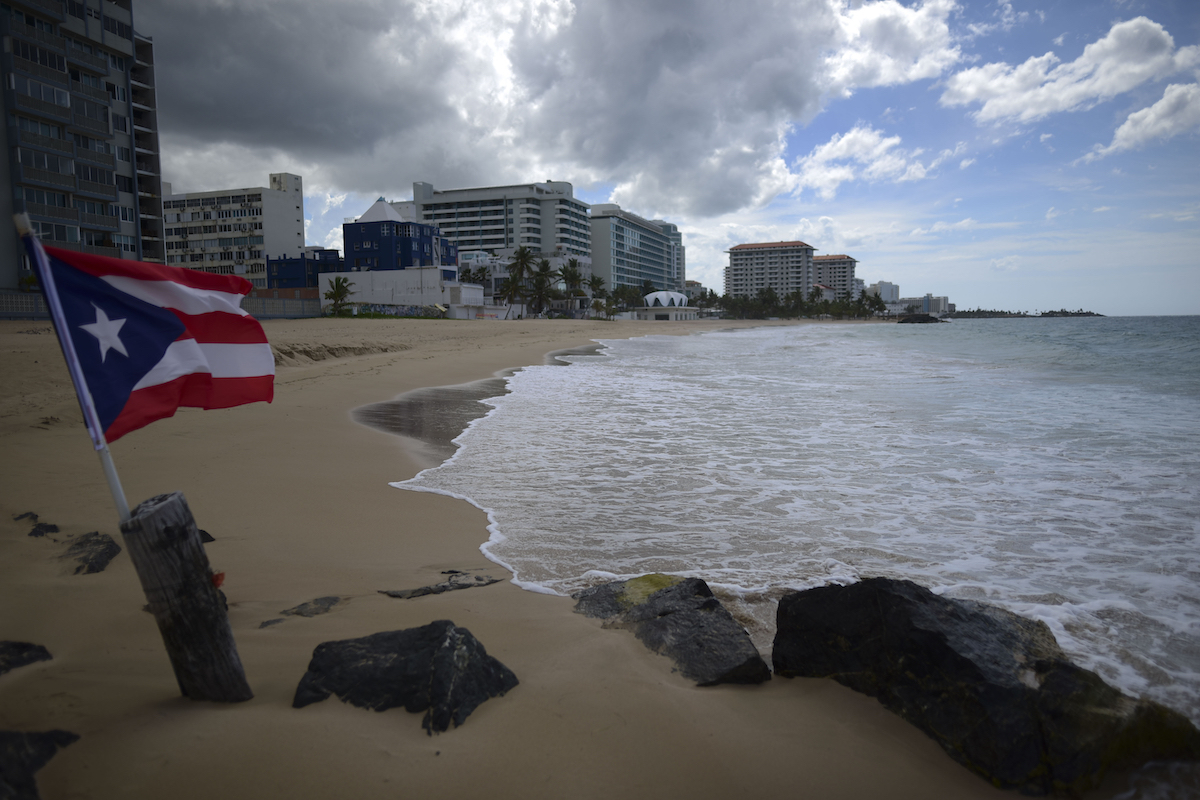

A Puerto Rican flag flies on an empty beach at Ocean Park, in San Juan, Puerto Rico, Thursday, May 21, 2020 (AP Photo/Carlos Giusti)
On February 16, during a recent virtual town hall meeting, Senator Charles Schumer (D-NY) expressed his opposition to a bill proposing the admission of Puerto Rico as a state of the Union and slammed the current colonial tax haven laws on the island which permit U.S. millionaires to legally dodge federal corporate taxes on the U.S. territory. As a direct attack on Puerto Rico’s governor, Senator Schumer expressed, “We ought to tell the governor, none of this bullshit where you let billionaires and millionaires escape taxes.” (It is important to note that the current governor of Puerto Rico, Pedro Pierluisi, is a corporate attorney.)
The statement came as a breath of fresh air about a topic that has rarely been exposed at the national level. I lived in Puerto Rico for more than 18 years, where I worked for the island’s Senate president and Secretary of State. After that, I interned in Congress and at the White House. With this experience, I have been able to learn a great deal about the corporate-colonial scheme in Puerto Rico.
It is important to keep in mind that the century-old debate about Puerto Rico’s political status is nothing but a smokescreen to keep the people on the island divided—so members of Congress can say, “Puerto Rico is divided.” That allows Congress to declare that the island is not able to decide its future. But that’s not entirely true. In 2012, more than 61 percent of Puerto Ricans on the island voted in a referendum for statehood. In 2017, in a controversial referendum, 97% voted for statehood and in 2020, around 52% of registered voters voted for statehood.
Yet Congress has done nothing in response.
This should not be surprising, given the corporate sway over both political parties in Congress. The island has been exploited by corporate America for decades through exotic tax loopholes. These loopholes allow corporations and millionaires to pay zero federal taxes, while both the people of Puerto Rico and American taxpayers continue to bear an increasing tax burden every year. Those corporations in turn donate to the campaigns of members of Congress to perpetuate the island’s current colonial status with the United States. Puerto Ricans cannot vote for President of the United States and have unequal representation in Congress. Many U.S. corporations operating in Puerto Rico, notably pharmaceuticals and software companies, are big donors to both Democratic and Republican candidates, thus wielding great influence in Congress.
That power was significantly increased after the Citizens United vs. Federal Elections Commission ruling by the Supreme Court, which resolved that freedom of speech prohibited the government from restricting independent political expenditures by corporations. Its effect was to permit unlimited campaign spending in elections.
https://www.youtube.com/watch?v=sVG5hoWOOuI&t=7s
It would not be far-fetched to argue that the reason Puerto Rico’s requests for statehood have been ignored is all because of this: if the island ultimately became a state, many American corporations in Puerto Rico (who are also big donors to Congress) might lose these tax breaks that they now enjoy through their operations on the island.
In a nutshell, if Puerto Rico were to become a state, corporations and millionaires would have to pay their fair share of taxes and members of Congress would likely lose political donations from U.S. corporations operating on the island. How likely is that?
The people of Puerto Rico and American taxpayers deserve to know more about the tax havens created by corporate attorneys and the local government in Puerto Rico. It affects not only Puerto Ricans, but mainstream America as well, which is why I thank Sen. Schumer for having the courage to expose the disgusting, legal, yet immoral, corporate tax evasion schemes in Puerto Rico.
Why do we need a minimum corporate tax, you ask? pic.twitter.com/opDmdbeUEe
— Gabriel Zucman (@gabriel_zucman) April 5, 2021
In closing, if members of Congress aren’t willing to grant statehood to Puerto Rico, they should grant the island its alienable right to independence, as a free and sovereign country. Members of Congress can no longer perpetuate a colony to benefit big corporate donors who contribute to their campaigns, while the majority of people on the island remain in poverty.
The United States cannot have it both ways.
***
Phillip Arroyo is a licensed Florida attorney and was a 2012 White House intern at the Office of Vice President Joe Biden. Twitter: @PhillipArroyo.



[…] IRS is currently cracking down on those using Puerto Rico as a tax haven. Critics of Act 60 and its encouragement of wealthy transplants claim that gentrification is raising housing prices […]